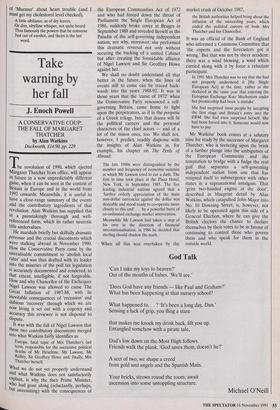Take warning by her fall
J. Enoch Powell
A CONSERVATIVE COUP: THE FALL OF MARGARET THATCHER
by Alan Watkins
Duckworth, £14.90, pp. 229
I
he revolution of 1990, which ejected Margaret Thatcher from office, will appear In future in a now unpredictably different guise, when it can be seen in the context of Britain in Europe and in the world from 1992 onwards. Meanwhile, it is useful to have a close-range summary of the events and the contributory ingredients of that revolution. Alan Watkins has supplied this In a painstakingly thorough and well- referenced form, which its rather neurotic title undervalues.
He marshals briefly but skilfully dramatis Personae and the crucial discontents which were stalking abroad in November 1990. How the Conservative Party came by the unrealisable commitment to 'abolish local rates' and was thus drafted with its leader ■ nto the miseries of the poll tax legislation IS accurately documented and rendered, to that extent, intelligible, if not forgivable. How and why Chancellor of the Exchequer Nigel Lawson was allowed to cause The Great Inflation of 1987-88, with its Inevitable consequences of 'recession' and dubious 'recovery' through which we are now living is set out with a cogency and accuracy this reviewer is not disposed to dispute.
It was with the fall of Nigel Lawson that these two contributory discontents merged Into what Watkins fairly identifies as
Europe, fatal topic of Mrs Thatcher's last term, responsible for the successive political deaths of Mr Heseltine, Mr Lawson, Mr Ridley, Sir Geoffrey Howe and, finally, Mrs Thatcher herself.
What we do not yet properly understand and what Watkins does not satisfactorily explain, is why the then Prime Minister, Who had gone along (reluctantly, perhaps, but unresisting) with the consequences of the European Communities Act of 1972 and who had forced down the throat of Parliament the Single European Act of 1986, suddenly broke cover at Bruges in September 1988 and revealed herself as the Paladin of the self-governing independent nation; nor why, moreover, she performed this dramatic reversal not only without securing the backing of a united Cabinet but after creating the formidable alliance of Nigel Lawson and Sir Geoffrey Howe against her.
We shall no doubt understand all that better in the future, when the lines of events still to come can be traced back- wards into the years 1988-92. It was in those years that the 'curse of 1972' when the Conservative Party renounced a self- governing Britain, came home to light upon the perpetrators, as if in the penpetia of a Greek trilogy. Into that drama will fit the political careers and the personal characters of the chief actors — and of a lot of the minor ones, too, We shall not, however, I predict, readily dispense with the insights of Alan Watkins in, for example, his chapter on The Perils of Abroad: The late 1980s were distinguished by the number and frequency of economic summits at which Mr Lawson tried to cut a dash. The first in time took place at the Plaza Hotel, New York, in September 1985. The five leading industrial nations agreed that a 'further orderly appreciation of the main non-dollar currencies against the dollar was desirable and stood ready to co-operate more closely to this end'. . . by a powerful burst of co-ordinated exchange market intervention. Meanwhile Mr Lawson had taken a step of his own in the direction of financial internationalisation: in 1986 he decided that sterling should shadow the mark.
When all this was overtaken by the market crash of October 1987,
the British authorities helped bring about the inflation of the succeeding years, which ended the political careers of both Mrs Thatcher and her Chancellor.
It was an official of the Bank of England who informed a Commons Committee that 'the experts and the forecasters got it wrong.' But that was not by sheer accident: there was a wind blowing, a wind which carried along with it by force a reluctant participant.
In 1991 Mrs Thatcher was to say that she had not properly understood it [the Single European Act] at the time, rather as she declared in the same year that entering the European Exchange Rate Mechanism under her premiership had been 'a mistake'.
She had surprised most people by accepting the first stage and Britain's entry into the ERM. She had even surprised herself. She had been forced into it. Someone would now have to pay.
Mr Watkins' book comes at a salutary time for study by the successor of Margaret Thatcher, who is teetering upon the brink of a further plunge into the ambiguities of the European Community and the temptation to bridge with a fudge the real gulf that separates a self-governing independent nation from one that has resigned itself to submergence with other states in a supranational amalgam. That 'grim two-handed engine at the door', described in blueprint detail by Alan Watkins, which catapulted John Major into No. 10 Downing Street, is, however, not likely to be operated again this side of a General Election, where he can give the British electors the chance to declare themselves by their votes to be in favour of continuing to control those who govern them and who speak for them in the outside world.










































































 Previous page
Previous page